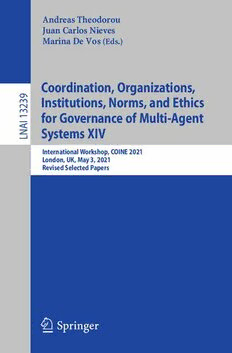Table Of ContentAndreas Theodorou
Juan Carlos Nieves
Marina De Vos (Eds.)
Coordination, Organizations,
9
Institutions, Norms, and Ethics
3
2
3
for Governance of Multi-Agent
1
I
A
Systems XIV
N
L
International Workshop, COINE 2021
London, UK, May 3, 2021
Revised Selected Papers
123
Lecture Notes in Artificial Intelligence 13239
Subseries of Lecture Notes in Computer Science
SeriesEditors
RandyGoebel
UniversityofAlberta,Edmonton,Canada
WolfgangWahlster
DFKI,Berlin,Germany
Zhi-HuaZhou
NanjingUniversity,Nanjing,China
FoundingEditor
JörgSiekmann
DFKIandSaarlandUniversity,Saarbrücken,Germany
Moreinformationaboutthissubseriesathttps://link.springer.com/bookseries/1244
· ·
Andreas Theodorou Juan Carlos Nieves
Marina De Vos (Eds.)
Coordination, Organizations,
Institutions, Norms, and Ethics
for Governance of Multi-Agent
Systems XIV
International Workshop, COINE 2021
London, UK, May 3, 2021
Revised Selected Papers
Editors
AndreasTheodorou JuanCarlosNieves
UmeåUniversity UmeåUniversity
Umeå,Sweden Umeå,Sweden
MarinaDeVos
UniversityofBath
ClavertonDown,UK
ISSN 0302-9743 ISSN 1611-3349 (electronic)
LectureNotesinArtificialIntelligence
ISBN 978-3-031-16616-7 ISBN 978-3-031-16617-4 (eBook)
https://doi.org/10.1007/978-3-031-16617-4
LNCSSublibrary:SL7–ArtificialIntelligence
©SpringerNatureSwitzerlandAG2022
Thisworkissubjecttocopyright.AllrightsarereservedbythePublisher,whetherthewholeorpartofthe
material is concerned, specifically the rights of translation, reprinting, reuse of illustrations, recitation,
broadcasting, reproduction on microfilms or in any other physical way, and transmission or information
storageandretrieval,electronicadaptation,computersoftware,orbysimilarordissimilarmethodologynow
knownorhereafterdeveloped.
Theuseofgeneraldescriptivenames,registerednames,trademarks,servicemarks,etc.inthispublication
doesnotimply,evenintheabsenceofaspecificstatement,thatsuchnamesareexemptfromtherelevant
protectivelawsandregulationsandthereforefreeforgeneraluse.
Thepublisher,theauthors,andtheeditorsaresafetoassumethattheadviceandinformationinthisbookare
believedtobetrueandaccurateatthedateofpublication.Neitherthepublishernortheauthorsortheeditors
give a warranty, expressed or implied, with respect to the material contained herein or for any errors or
omissionsthatmayhavebeenmade.Thepublisherremainsneutralwithregardtojurisdictionalclaimsin
publishedmapsandinstitutionalaffiliations.
ThisSpringerimprintispublishedbytheregisteredcompanySpringerNatureSwitzerlandAG
Theregisteredcompanyaddressis:Gewerbestrasse11,6330Cham,Switzerland
Preface
This volume collates selected revised papers presented at the 2021 edition of
the Coordination, Organization, Institutions, Norms, and Ethics for Governance of
Multi-Agent Systems (COINE). The workshop was held on May 3, 2021, and was
co-located with the 20th International Conference on Autonomous Agents and Multi-
agentSystems(AAMAS)—originallysetinLondon,UK,butheldvirtuallyduetothe
COVID-19pandemicsituation.
Thisistheseconditerationoftheworkshopsinceitsrelabelingin2020asCOINE
from its earlier form: COIN (Coordination, Organizations, Institutions and Norms in
AgentSystems).Thismodificationmakesexplicittheconsiderationofethicalaspectsas
acorepartofthegovernanceofsocialsystems—theoverarchingthemeoftheCOINE
workshopseries.Despiteitsnewname,COINEcontinuesthetraditionofitspredecessor
bybringingtogetherresearchersinautonomousagentsandmulti-agentsystemsworking
onthescientificandtechnologicalaspectsofsocialcoordination,organizationaltheory,
normativeMAS,artificialorelectronicinstitutions,andnorm-awareandethicalagents.
COINE 2021 received 12 submissions all which underwent two rounds of single-
blind peer review. Each submission received feedback by at least three reviewers;
this initial assessment was part of the admission to the presentation. Given the
recommendations made by the reviewers, nine papers were admitted: six submissions
wereacceptedforfullpresentationsandthreeforshortpresentations.Allarticleswere
subsequently refined and extended, based on feedback received as part of the reviews
andthepresentations,andunderwentasecondroundofreviewsbeforeinclusioninthis
post-proceedingsvolumeasfullpapers.
Inadditiontothepeer-reviewed submissions,twoinvitedspeakerspresentedtheir
work. The first speaker, Marija Slavkovik, introduced the field of machine ethics and
its relationship with normative reasoning. Slavkovik presented open challenges and
discussedhowtheCOINEcommunitycanengagewiththefield.Thesecondspeaker,
JulianPadget,arguedhowconscientiousdesigncanbeusedasaprincipledapproachfor
the ethical design and deployment of value-driven agents. Padget discussed how such
agents canreflectthewaysocialinstitutionsareconnected throughthegovernance of
physicalinteractionandfacilitatehuman-to-humaninteraction.
Thisproceedingsvolumeorganizestheworkshoppapersintothreetopics:1)Invited
Talks; 2) Conceptual Frameworks Architectures for Collaboration and Coordination;
and3)ModelingandUnderstandingSocialBehaviorUsingCOINETechnologies.The
firsttopiccontainsanabstractfromoneofthetwoinvitedspeakers.Next,wefocuson
articlespresentingfundamentalresearchonembeddingandoptimisingsocialbehavior
in normative agents. The final topic contains papers where COINE technologies have
beenusedtoprovideabetterunderstandinghumansocialintelligence.
vi Preface
InvitedTalks
– Machine ethics - is it just normative multi-agent systems? by Marija Slavkokik. In
thisextendedabstract,Slavkokikprovidesanoverviewofthefieldofmachineethics
bydiscussingitsrelationshiptonormativereasoning.
Conceptual Frameworks Architectures for Collaboration
andCoordination
Thistopicoftheproceedingsisdedicatedtoapproachesthatproposeconceptualframe-
worksandotherarchitecturesfordevelopingsocially-awareagents.Thisthemecontains
workrelatedtotheemergenceandoptimizationofCOINEconcepts,e.g.norms,which
facilitatecoordinationandcollaboration.
– AFrameworkforAutomaticMonitoringofNormsthatRegulateTimeConstrained
ActionsbyNicolettaFornara,SoheilRoshankish,andMarcoColombetti.Thispaper
provides a framework for modeling norms, using operational semantics, to enable
reasoningwiththesenormstoautomaticallycomputenormsviolationandfulfilment.
– CollaborativeHuman-AgentPlanningforResiliencebyRonalSingh,TimMiller,and
DarrynReid.Thisworkinvestigateshowhumaninsightscanbeprovidedatrun-time
withoutchangingtheartificialagent’sdomainmodelinordertoimprovecollaboration
inhuman-machineteamingscenarios.
– Environmental consequences of the status-functions in artificial institutions by
RafhaelCunha,JomiHubner,andMaiqueldeBrito.Thisworkproposestheexpres-
sionoftheconsequencesintheenvironmentofstatusfunctionsinartificialinstitution
toaidagents’reasoningovertheirsocialgoals.
– Noe:NormsEmergenceandRobustnessBasedonEmotionsinMultiagentSystems
bySz-TingTzeng,NiravAjmeri,andMunindar P.Singh.Theauthorsexplore how
consideringemotionalresponsestotheoutcomesofnormsatisfactionandviolation
affects the emergence and robustness of social norms. Their result demonstrate an
improvementinnormscomplianceandpromotionofsocietalwelfare.
– Run-time Norms Synthesis in Multi-Objective by Multi-Agent Systems by Maha
RiadandFatemehGolpayegani.Thispapersproposesarun-timeutility-basednorm
synthesis approach as a mechanism for agents to understand the impact of a sug-
gestednormontheirobjectivesanddecidewhetherornottoadoptit.Theaddition
of this reasoning mechanism allows agents to optimize against multiple objectives:
coordinatingtheirbehaviorwhileachievinganynorms-conflictingobjectives.
Modeling and Understanding Social Behavior Using COINE
Technologies
Thepapersinthisthematicsectiondrawuponreal-worlddatasetsorotherwiseground
their assumptions in the literature to investigate social phenomena and provide new
insightsandsolutionstosocialproblems.
Preface vii
– A Bayesian model of information cascades by Sriashalya Srivathsan and Stephen
Cranefield. This paper presents a Bayesian model of information cascades. The
authors demonstrate how cascades will not necessarily occur and that adding prior
agents’informationwilldelayanyeffectsofcascades.
– Interactions between social norms and incentive mechanisms in organizations
by Ravshanbek Khodzhimatov, Stephan Leitner, and Friederike Wall. This paper
focusesonhowindividualsocially-awarebehaviorinterfereswithperformance-based
incentivemechanismsinmulti-agentorganizations.Theauthorsdiscusshowpromot-
ingsocially-acceptedbehaviormightreduceanorganization’sperformance,butthat
reductioncanbemitigatingbyusingindividual-basedincentives.
– LearningforDetectingNormViolationinOnlineCommunitiesbyThiagoFreitasdos
Santos,NardineOsman,andMarcoSchorlemmer.Thispaperdemonstrateshowthe
detectionandgenerationofexplanationsfornormsviolationscanbeusedtomitigate
the ill-effects that arise when different members of an online community interpret
normsindifferentways.Areal-worldusecase,basedontheWikipediaeditsdata,is
presented.
– SolvingsocialdilemmasbyreasoningaboutexpectationsbyAbiraSengupta,Stephen
Cranefield, and Jeremy Pitt. This article investigates how explicit reasoning about
expectations,i.e.future-directedbeliefsthatagentshave,canbeusedtoencodeboth
traditionalgametheorysolutionconceptsandsocialmechanismsinsocialdilemma
situations. The authors model a collective risk dilemma, based on the plain-plateau
scenario, and show how using expectations in the reasoning mechanisms enables
cooperationtotakeplace.
WewouldliketothankeveryonewhohelpedtomakeCOINE2021asuccessand
wehopethatyouenjoytheseproceedings.
MarinaDeVos
JuanCarlosNieves
AndreasTheodorou
Organization
ProgramChairs
MarinaDeVos UniversityofBath,UK
JuanCarlosNieves UmeåUniversity,Sweden
AndreasTheodorou UmeåUniversity,Sweden
ProgramCommittee
HuibAldewereld HUUniversityofAppliedSciencesUtrecht,
TheNetherlands
AndreaAlerTubella UmeåUniversity,Sweden
StefaniaCostantini Universitàdell’Aquila,Italy
VirginiaDignum UmeåUniversity,Sweden
NicolettaFornara UniversitàdellaSvizzeraitaliana,Switzerland
ChristopherFrantz NorwegianUniversityofScienceandTechnology,
Norway
PabloNoriega IIIA-CSIC,Spain
LuísMonizPereira UniversidadeNovadeLisboa,Portugal
JaimeSimãoSichman UniversityofSãoPaulo,Brazil
WambertoVasconcelos UniversityofAberdeen,UK
JavierVazquezSalceda UniversitatPolitecnicade
Catalunya-BarcelonaTech,Spain
HarkoVerhagen StockholmUniversity,Sweden
GeorgeVouros UniversityofPiraeus,Greece
AdditionalReviewers
PetterEricson UmeåUniversity,Sweden
EstebanGuerrero UniversityofVaasa,Finland
TimotheusKampik UmeåUniversity,Sweden
RenéMellema UmeåUniversity,Sweden
JulianAlfredoMendez UmeaUniversity,Sweden
AdditionalSessionChairs
TimotheusKampik UmeåUniversity,Sweden
AndreasaMorrisMartin UniversityofBath,UK
Contents
InvitedSpeaker
MachineEthics-IsItJustNormativeMulti-agentSystems? ................. 3
MarijaSlavkovik
Conceptual Frameworks Architectures for Collaboration and
Coordination
AFrameworkforAutomaticMonitoringofNormsthatRegulateTime
ConstrainedActions ................................................... 9
NicolettaFornara,SoheilRoshankish,andMarcoColombetti
CollaborativeHuman-AgentPlanningforResilience ....................... 28
RonalSingh,TimMiller,andDarrynReid
EnvironmentalConsequencesofInstitutionalFactsinArtificialInstitutions .... 44
RafhaelR.Cunha,JomiF.Hübner,andMaiqueldeBrito
Noe:NormEmergenceandRobustnessBasedonEmotionsinMultiagent
Systems .............................................................. 62
Sz-TingTzeng,NiravAjmeri,andMunindarP.Singh
Run-TimeNormsSynthesisinMulti-objectiveMulti-agentSystems .......... 78
MahaRiadandFatemehGolpayegani
Modeling and Understanding Social Behavior Using COINE
Technologies
ABayesianModelofInformationCascades ............................... 97
SriashalyaSrivathsan,StephenCranefield,andJeremyPitt
Interactions Between Social Norms and Incentive Mechanisms
inOrganizations ....................................................... 111
RavshanbekKhodzhimatov,StephanLeitner,andFriederikeWall
LearningforDetectingNormViolationinOnlineCommunities .............. 127
ThiagoFreitasdosSantos,NardineOsman,andMarcoSchorlemmer

